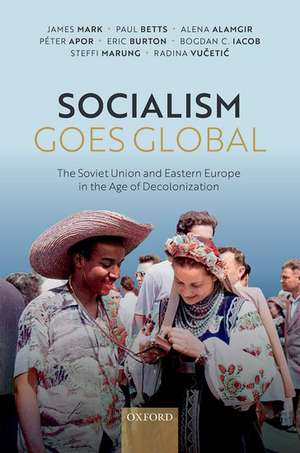Socialism Goes Global: The Soviet Union and Eastern Europe in the Age of Decolonisation
Editat de James Mark, Paul Bettsen Limba Engleză Hardback – 3 feb 2022
| Toate formatele și edițiile | Preț | Express |
|---|---|---|
| Paperback (1) | 170.67 lei 10-16 zile | |
| OUP OXFORD – 7 mai 2024 | 170.67 lei 10-16 zile | |
| Hardback (1) | 616.65 lei 10-16 zile | |
| OUP OXFORD – 3 feb 2022 | 616.65 lei 10-16 zile |
Preț: 616.65 lei
Preț vechi: 699.59 lei
-12% Nou
Puncte Express: 925
Preț estimativ în valută:
117.100€ • 123.61$ • 97.79£
117.100€ • 123.61$ • 97.79£
Carte disponibilă
Livrare economică 07-13 martie
Preluare comenzi: 021 569.72.76
Specificații
ISBN-13: 9780192848857
ISBN-10: 0192848852
Pagini: 384
Dimensiuni: 162 x 240 x 25 mm
Greutate: 0.72 kg
Editura: OUP OXFORD
Colecția OUP Oxford
Locul publicării:Oxford, United Kingdom
ISBN-10: 0192848852
Pagini: 384
Dimensiuni: 162 x 240 x 25 mm
Greutate: 0.72 kg
Editura: OUP OXFORD
Colecția OUP Oxford
Locul publicării:Oxford, United Kingdom
Recenzii
Nevertheless, that only goes to further demonstrate the significance of the themes of this book, and the impressive effort that these contributors have put forth.
Wide-ranging and incisive, Socialism Goes Global marks the culmination of a decade's intensive efforts to understand the global place of central and Eastern Europe before and during the Cold War. Covering everything from development to diplomacy, from race to rights, the book also points the way forward, and will guide fruitful work for decades to come. Required reading for anyone interested in the region's past, present, and future.
This fascinating book provides an innovative overview of the relationship between Eastern Europe and the Global South, documenting the wealth of interactions in economic relations, politics, military relations, intellectual life, culture, health, mobility, labour, and human rights. The book breaks new ground, both historiographically and methodologically, and will become a mandatory reference for anyone studying the global reach of Eastern European socialism.
This insightful, well-arranged volume elucidates multiple encounters between "Second" and "Third Worlds" in what is now referred to as the global Cold War. Essential reading for students of imperialism and anti-colonialism.
An excellent overview of a much neglected topic: the crucial links that existed between socialist countries and newly liberated countries in post-colonial regions. The thematic approach helps show both the significance of these connections and their limitations.
All historians interested in the relationship between the socialist world, imperialism, and anti-imperialism should be grateful to these scholars for the work they have done and for putting together this helpful and stimulating volume.
Rich in evidence and imaginative in conception, it is a testament to the value of collective scholarship in the writing of global history.
Wide-ranging and incisive, Socialism Goes Global marks the culmination of a decade's intensive efforts to understand the global place of central and Eastern Europe before and during the Cold War. Covering everything from development to diplomacy, from race to rights, the book also points the way forward, and will guide fruitful work for decades to come. Required reading for anyone interested in the region's past, present, and future.
This fascinating book provides an innovative overview of the relationship between Eastern Europe and the Global South, documenting the wealth of interactions in economic relations, politics, military relations, intellectual life, culture, health, mobility, labour, and human rights. The book breaks new ground, both historiographically and methodologically, and will become a mandatory reference for anyone studying the global reach of Eastern European socialism.
This insightful, well-arranged volume elucidates multiple encounters between "Second" and "Third Worlds" in what is now referred to as the global Cold War. Essential reading for students of imperialism and anti-colonialism.
An excellent overview of a much neglected topic: the crucial links that existed between socialist countries and newly liberated countries in post-colonial regions. The thematic approach helps show both the significance of these connections and their limitations.
All historians interested in the relationship between the socialist world, imperialism, and anti-imperialism should be grateful to these scholars for the work they have done and for putting together this helpful and stimulating volume.
Rich in evidence and imaginative in conception, it is a testament to the value of collective scholarship in the writing of global history.
Notă biografică
James Mark is Professor of Modern European History at the University of Exeter. He has published widely on the social and cultural history of Communism, history and memory, and the global history of Eastern Europe. He is the author of three monographs, most recently co-authoring 1989: A Global History of Eastern Europe with Bogdan Iacob, Tobias Rupprecht, and Ljubica Spaskovska.Paul Betts is Professor of Professor of Modern European History at St Antony's College, Oxford, and previously taught at the University of Sussex and the University of North Carolina at Charlotte. He has published widely on 20th century European cultural history, and is the author of three monographs, most recently Ruin and Renewal: Civilising Europe after World War II (2020). He has also published seven co-edited volumes, and serves on the Editorial Board of Past & Present.
